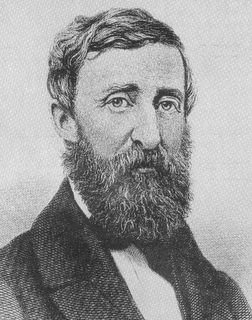 Thoreau and Transcendentalism: A major premise of transcendentalism entails the idea of striking a balance between industry and nature. Otherwise known as the pastoral ideal, this balance could effectively be achieved through simplifying and harmonizing man's position in the natural world. It seems that man's destiny is to rip materials from First Nature (that which God creates) and transform them into Second Nature (that which man builds). Nineteenth-century America saw a rapid rise in the pace of industrialization, and thus, transcendentalists like Henry David Thoreau became concerned. To a certain degree, finding the balance between industry and nature is a constant process. Convinced that America was heading down the wrong path with respect to industrialization, Thoreau attempted to reshape the way that Americans understood their relationship to nature. In fact, with his 1854 publication of Walden, Thoreau put forth his vision for a basic life in which man could live on mere subsistence farming and sub-manufacture. Through rudimentary farming techniques and rigorous self-discipline, an elemental existence for mankind was achievable. Therefore, Thoreau's time spent at Walden Pond serves as an indelible testament to the transcendental movement.
Thoreau and Transcendentalism: A major premise of transcendentalism entails the idea of striking a balance between industry and nature. Otherwise known as the pastoral ideal, this balance could effectively be achieved through simplifying and harmonizing man's position in the natural world. It seems that man's destiny is to rip materials from First Nature (that which God creates) and transform them into Second Nature (that which man builds). Nineteenth-century America saw a rapid rise in the pace of industrialization, and thus, transcendentalists like Henry David Thoreau became concerned. To a certain degree, finding the balance between industry and nature is a constant process. Convinced that America was heading down the wrong path with respect to industrialization, Thoreau attempted to reshape the way that Americans understood their relationship to nature. In fact, with his 1854 publication of Walden, Thoreau put forth his vision for a basic life in which man could live on mere subsistence farming and sub-manufacture. Through rudimentary farming techniques and rigorous self-discipline, an elemental existence for mankind was achievable. Therefore, Thoreau's time spent at Walden Pond serves as an indelible testament to the transcendental movement.
Wednesday, November 29, 2006
Thoreau and Transcendentalism
 Thoreau and Transcendentalism: A major premise of transcendentalism entails the idea of striking a balance between industry and nature. Otherwise known as the pastoral ideal, this balance could effectively be achieved through simplifying and harmonizing man's position in the natural world. It seems that man's destiny is to rip materials from First Nature (that which God creates) and transform them into Second Nature (that which man builds). Nineteenth-century America saw a rapid rise in the pace of industrialization, and thus, transcendentalists like Henry David Thoreau became concerned. To a certain degree, finding the balance between industry and nature is a constant process. Convinced that America was heading down the wrong path with respect to industrialization, Thoreau attempted to reshape the way that Americans understood their relationship to nature. In fact, with his 1854 publication of Walden, Thoreau put forth his vision for a basic life in which man could live on mere subsistence farming and sub-manufacture. Through rudimentary farming techniques and rigorous self-discipline, an elemental existence for mankind was achievable. Therefore, Thoreau's time spent at Walden Pond serves as an indelible testament to the transcendental movement.
Thoreau and Transcendentalism: A major premise of transcendentalism entails the idea of striking a balance between industry and nature. Otherwise known as the pastoral ideal, this balance could effectively be achieved through simplifying and harmonizing man's position in the natural world. It seems that man's destiny is to rip materials from First Nature (that which God creates) and transform them into Second Nature (that which man builds). Nineteenth-century America saw a rapid rise in the pace of industrialization, and thus, transcendentalists like Henry David Thoreau became concerned. To a certain degree, finding the balance between industry and nature is a constant process. Convinced that America was heading down the wrong path with respect to industrialization, Thoreau attempted to reshape the way that Americans understood their relationship to nature. In fact, with his 1854 publication of Walden, Thoreau put forth his vision for a basic life in which man could live on mere subsistence farming and sub-manufacture. Through rudimentary farming techniques and rigorous self-discipline, an elemental existence for mankind was achievable. Therefore, Thoreau's time spent at Walden Pond serves as an indelible testament to the transcendental movement.
Subscribe to:
Post Comments (Atom)
No comments:
Post a Comment